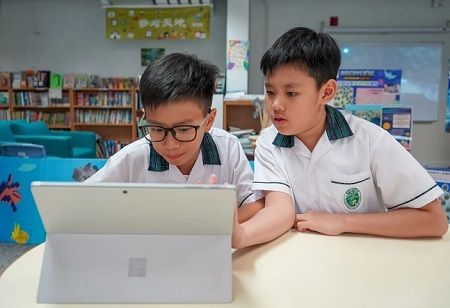US technology giant Microsoft is demonstrating a long-term commitment to offering generative artificial intelligence (GenAI) services in Hong Kong through educational initiatives, despite its investee OpenAI limiting access in the city and mainland China. In its recent efforts to integrate AI into classrooms, Microsoft collaborated with the Education University of Hong Kong Jockey Club Primary School to provide AI services starting from the last academic year, which concluded in June. Approximately 220 pupils in grades 5 and 6 were given access to Microsoft’s chatbot and text-to-image generation tools, powered by OpenAI’s GPT and Dall-E models, during their science classes.
This partnership follows Microsoft's agreements with eight universities in Hong Kong last year to promote its AI services. The US tech giant is expanding into the K-12 sector through its global training partner Gamenoodlesoup, a developer of education and entertainment technology. Anderson Yu, the founder of Gamenoodlesoup, stated that his company has been working with the school since April 2023 to tailor Microsoft Azure cloud services to meet the school's specific needs.
“I think our education offerings in Hong Kong definitely will continue”, said Fred Sheu, national technology officer at Microsoft Hong Kong. Microsoft plans to “roll out this solution to all the schools in Hong Kong. That’s definitely our strategy and plan in the next few years”.
Microsoft has been heavily pushing its AI services in Asia and has maintained its commitment to Hong Kong even as rivals keep their distance amid US-China geopolitical tensions. OpenAI recently restricted access in the city to its application programming interface (API). Sheu reiterated Microsoft’s earlier guarantee to maintain its Azure AI services, which rely on OpenAI’s models, saying the API restrictions have “no impact” on the tech giant. Microsoft’s OpenAI investment reportedly entitles it to as much as 49 percent of the profits of the organization’s for-profit arm.
Microsoft’s operations in China have recently come under political scrutiny in the US. Last month, US lawmakers questioned Microsoft president Brad Smith about the company’s activities in China. Smith disclosed that China contributes just 1.5 percent to Microsoft's global revenue and confirmed that the company is offering to relocate 700 to 800 employees to other markets. Specifically for AI services, Microsoft faces the same challenge as many other tech firms: demonstrating the practical value of GenAI in real-world applications.
Elsa Cheung Kam Yan, principal of the Jockey Club Primary School, believes that incorporating AI can improve the effectiveness of learning and teaching, providing students with “widened exposure” to information and greater freedom to explore beyond their textbooks. The school, which has partnered with Microsoft Hong Kong for 12 years, intends to extend the use of AI to more classes, according to vice-principal Philip Law Kam Yuen.

